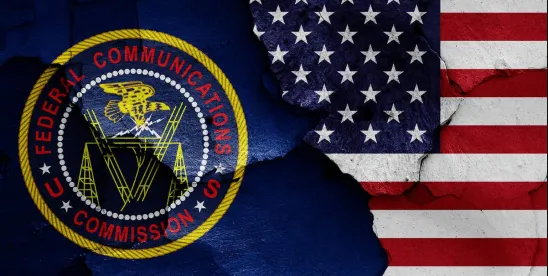In our previous alert, Tick-Tock, Don’t Get Caught: Navigating TCPA’s Quiet Hours, we discussed a growing wave of lawsuits targeting businesses under the Telephone Consumer Protection Act (“TCPA”) for allegedly sending text messages outside the Federal Communications Commission’s (“FCC”) designated 8:00 AM to 9:00 PM window. These suits often involve texts sent just minutes before or after the hour. Worse yet, these suits frequently target businesses whose customers had voluntarily opted into Short Message Service (“SMS”) programs. As we explained, under the plain language of the TCPA and the FCC’s rules, such messages should not be considered “telephone solicitations” at all, because the recipients gave prior express consent. As a result, they should not also be subject to the quiet hours rule.
Subsequently, the FCC took an important step that could clarify this issue. Recently, the FCC released a Public Notice seeking comment on whether the TCPA’s quiet hours apply to text messages sent with the recipient’s prior express consent. The Public Notice has drawn strong responses from both sides of the debate, including plaintiff’s attorneys, consumer advocacy groups, industry associations, and privacy-focused nonprofits. This development suggests that regulatory guidance could be forthcoming—but until then, litigation risk remains.
The FCC’s Public Notice
In its Public Notice, the FCC asked for input on whether its rules prohibit businesses from sending text messages for telemarketing purposes outside the 8:00 AM to 9:00 PM window, even if the message was sent with the consumer’s prior express consent. The FCC also invited comment on related issues in the alternative, including whether there is a non-rebuttable assumption that the NPA-NXX (i.e., the area code and local exchange of the called party) is indicative of the called party’s location when applied to wireless phone numbers.
Comments on the Petition
Several industry stakeholders filed comments supporting the petition. These commenters emphasize the plain language of the TCPA and the FCC’s own rules, which state a “telephone solicitation” does not include calls or messages made with the recipient’s prior express invitation or permission. Because the quiet hours restrictions apply only to “telephone solicitations,” the argument goes, messages sent with prior consent should be exempt by definition.
Supporters argue that requiring businesses to track the local time zone of each customer creates an unreasonable compliance hurdle, especially given the mobile nature of modern communications. Responsible Enterprises Against Consumer Harassment (“R.E.A.C.H.”) included data showing a month-over-month increase in the number of cases filed and warned that without FCC intervention, a growing number of class actions will exploit the ambiguity around this issue.
However, several organizations and law firms that regularly advocate for consumer protections filed comments opposing the petition. These commenters generally argue that the quiet hours rule applies to all marketing messages, regardless of consent, and that carving out an exception would undermine consumer privacy. For example, the Law Offices of Jibrael S. Hindi—a firm that has filed many of the recent lawsuits under this theory—opposed the petition. The firm claimed consumers may not expect to receive messages during early morning or late evening hours, even if they opted into a marketing program, and suggested consent should not extend to contact during quiet hours unless explicitly disclosed and agreed to. The National Consumer Law Center (“NCLC”) likewise encouraged the FCC to allow the issue to play out in the courts and argued against creating a presumption about quiet times based on the called party’s area code and local exchange.
What Comes Next
Now that the comment period has closed, the FCC will review the submissions and decide whether to issue a declaratory ruling. There is no set timeline for the Commission to act, and it may take several months (or longer) before any formal decision is issued. In the meantime, plaintiffs’ attorneys may continue filing lawsuits under the current ambiguity.
What Businesses Should Do in the Meantime
Until the FCC provides definitive guidance, businesses that engage in SMS marketing should consider the following steps to reduce legal exposure:
- Respect the Quiet Hours: Even if you have a strong argument your messages are exempt, the safest course is to avoid sending marketing texts before 8:00 AM or after 9:00 PM in any time zone in the United States.
- Audit Your Consent Process: Ensure your SMS terms clearly disclose the nature and timing of messages. Consider adding language that explains messages may be sent at any time, including early morning or evening hours.
- Implement Time-Zone Safeguards: Use geolocation tools or other technology to manage time-zone targeting. Even if not legally required, this step can show a good-faith effort to comply.
- Document Everything: Maintain records showing when and how a consumer provided consent, what disclosures were made, and when messages were sent.
- Monitor FCC Activity: Stay informed on the status of the petition and any related FCC guidance. An eventual ruling could impact how these lawsuits are litigated and defended. Businesses in litigation may wish to consider filing motions to stay pending the outcome of the FCC petition.
Conclusion
The FCC’s request for comment is a welcome sign that regulatory clarification may be on the horizon. However, until that clarification arrives, businesses must continue to navigate the uncertain legal terrain. Stakeholders remain hopeful that the FCC will confirm what the statute and regulations already suggest: that messages sent with prior express consent are not “telephone solicitations” and are, therefore, not subject to the quiet hours rule. In the meantime, businesses should remain vigilant, stay within the safe harbor when possible, and consult legal counsel when designing or updating their marketing programs.





 />i
/>i

